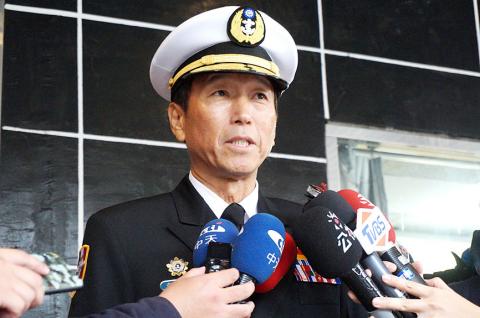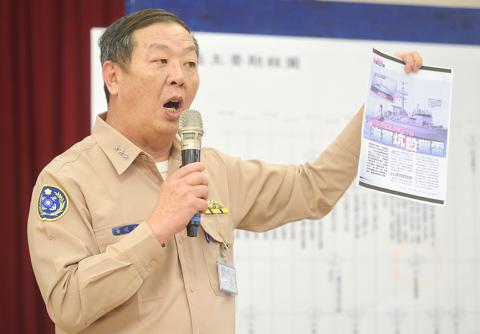The Ministry of National Defense (MND) yesterday censured a number of top navy officers, including Vice Minister of National Defense Admiral Pu Tze-chun (蒲澤春) and Chief of General Staff Admiral Lee Hsi-ming (李喜明), in connection with a minesweeper procurement scandal.
Disciplinary action was doled out for misconduct in contracting Ching Fu Shipbuilding Co (慶富造船) to build the vessels and a report on the minesweeper program presented by defense officials in the legislature last year, the ministry told a news conference.
A total of 24 officers were disciplined, it said.

Photo: Tu Chu-min, Taipei Times
A ministerial task force was called on Nov. 2 after an Executive Yuan investigative report found fault with the military’s handling of the contract with Ching Fu to build six minesweepers, the ministry said.
The probe found flaws in the military’s pre-bidding preparations, the contract, the process for awarding the bid and supervision of the contractor’s compliance with its obligations, it said.
Eighteen admirals and captains were disciplined for their role in the procurement, including Pu, who received a demerit.

Photo: Chang Chia-ming, Taipei Times
Lee and Navy Commander Rear Admiral Huang Shu-kuang (黃曙光), and former deputy minister of national defense Admiral Chen Yung-kang (陳永康) each received two warnings.
Vice Admiral Huang Hsi-ju (黃希儒), procurement division chief of the ministry’s Armaments Bureau, received a demerit.
Nine navy admirals and captains were censured for misinforming lawmakers on the progress that Ching Fu was making on the minesweeper program during a budget report on Nov. 17 last year, the ministry said.
The officers presented a report that was inaccurate, the ministry said, adding that the incident reflected organizational failures on multiple levels of the ministry.
Four of the nine censured for making inaccurate reports to the legislature were also involved in the minesweepers’ procurement.
Armaments Bureau Director-General Vice Admiral Mei Chia-shu (梅家樹) received one demerit and three warnings for his conduct in the procurement process and the budget report.
The officers the ministry censured are currently serving or had served at influential ministerial posts, as well as Navy Command Headquarters and the navy’s Planning Division.
The ministry’s internal investigation is ongoing and it has informed prosecutors of its findings, which might result in criminal proceedings, it said.
President Tsai Ing-wen (蔡英文) vowed to thoroughly investigate the minesweeper scandal, address the government’s shortcomings and forge ahead with the domestic warship program.
“We will find out the truth and uphold the highest standards of accountability. This program that was initiated by previous administration is clearly flawed. The program must be subjected to strict scrutiny, from decisionmaking to bidding, syndicated loans and contract supervision,” she said in a statement.
“Each and every relevant agency must fully cooperate with the investigation... Any individual who is guilty of corruption will receive no leniency, regardless of who they are or what rank they hold,” she said.
The government will keep its focus on problem-solving and correct errors regardless of when they first occurred, she said, adding that the nation needs a more effective procurement system that excludes unsuitable contractors.
Her administration will continue its policy to develop a domestic shipbuilding program, Tsai said.
“It is my hope that this error and failure will be a lesson for our armed forces to find the right path forward,” she said.
“The government’s resolve to be self-sufficient in national defense is unshakable. We will not allow an isolated incident to affect our determination to have navy ships built domestically,” she said.

Auckland rang in 2026 with a downtown fireworks display launched from New Zealand’s tallest structure, Sky Tower, making it the first major city to greet the new year at a celebration dampened by rain, while crowds in Taipei braved the elements to watch Taipei 101’s display. South Pacific countries are the first to bid farewell to 2025. Clocks struck midnight in Auckland, with a population of 1.7 million, 18 hours before the famous ball was to drop in New York’s Times Square. The five-minute display involved 3,500 fireworks launched from the 240m Sky Tower. Smaller community events were canceled across New Zealand’s

The Ministry of Foreign Affairs (MOFA) yesterday said it is closely monitoring developments in Venezuela, and would continue to cooperate with democratic allies and work together for regional and global security, stability, and prosperity. The remarks came after the US on Saturday launched a series of airstrikes in Venezuela and kidnapped Venezuelan President Nicolas Maduro, who was later flown to New York along with his wife. The pair face US charges related to drug trafficking and alleged cooperation with gangs designated as terrorist organizations. Maduro has denied the allegations. The ministry said that it is closely monitoring the political and economic situation

‘SLICING METHOD’: In the event of a blockade, the China Coast Guard would intercept Taiwanese ships while its navy would seek to deter foreign intervention China’s military drills around Taiwan this week signaled potential strategies to cut the nation off from energy supplies and foreign military assistance, a US think tank report said. The Chinese People’s Liberation Army (PLA) conducted what it called “Justice Mission 2025” exercises from Monday to Tuesday in five maritime zones and airspace around Taiwan, calling them a warning to “Taiwanese independence” forces. In a report released on Wednesday, the Institute for the Study of War said the exercises effectively simulated blocking shipping routes to major port cities, including Kaohsiung, Keelung and Hualien. Taiwan would be highly vulnerable under such a blockade, because it

UNRELENTING: China attempted cyberattacks on Taiwan’s critical infrastructure 2.63 million times per day last year, up from 1.23 million in 2023, the NSB said China’s cyberarmy has long engaged in cyberattacks against Taiwan’s critical infrastructure, employing diverse and evolving tactics, the National Security Bureau (NSB) said yesterday, adding that cyberattacks on critical energy infrastructure last year increased 10-fold compared with the previous year. The NSB yesterday released a report titled Analysis on China’s Cyber Threats to Taiwan’s Critical Infrastructure in 2025, outlining the number of cyberattacks, major tactics and hacker groups. Taiwan’s national intelligence community identified a large number of cybersecurity incidents last year, the bureau said in a statement. China’s cyberarmy last year launched an average of 2.63 million intrusion attempts per day targeting Taiwan’s critical